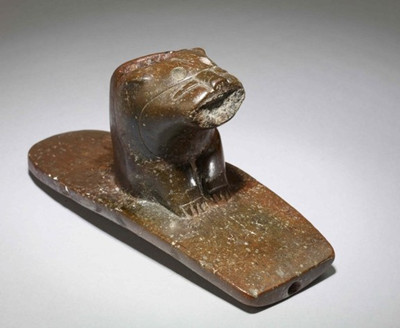Our pipe is about two thousand years old, which is the period from which we have the earliest evidence for tobacco use in North America. Tobacco was first cultivated in Central and South America, smoked wrapped in the leaves of other plants, and then enjoyed like a cigar. In the colder north, though, there were no wrapping leaves to be had through the long winters, so smokers had to find another way of containing their tobacco-and so they made pipes. The cigar/pipe divide seems very much to have been a result of climate.
这支2000年历史的烟斗来自我们已知的北美最早开始吸食烟草的年代,烟草最早种植于中美与南美,当地人用其他植物的叶子将其卷起来抽,就像雪茄一般。但在较冷的北方,人们在漫漫寒冬中找不到足够的叶子,便得用别的方式来盛放烟草,于是烟斗出现了。雪茄与烟斗之分,似乎部分是天气造成的。
Stone pipes are found consistently in the Ohio burial mounds. This indicates, I think, that they must have had some special place in the lives of the people that made and used them. Although archaeologists haven't yet understood their precise meaning, we can get an insight into how they may have been regarded. Here's the Native American historian Gabrielle Tayac:
俄亥俄墓葬群中频繁出现石制烟斗,表明它们曾在人们的生活中扮演重要角色。考古学家虽然还未能了解它们的确切意义,但我们已经可以根据现有的发现进行一些猜测。美洲印第安人国家博物馆导览员印第安土著历史学家加布里埃尔塔亚克博士认为:
There's a whole cosmology and theology that go with pipes, that are extremely complex. They carry with them all of the meanings of religious teachings.They are definitely considered to be living beings that should be treated as such, rather than just objects, or even sacred objects, that particularly come alive and come into their own power when the bowl is united with the stem. There are rituals and initiations that go along with it, there are tremendous responsibilities that go along with being a pipe-carrier in particular places. I even hesitate to call them objects.
烟斗中有一整套宇宙学和神学,包含着所有的宗教意义。在印第安人眼中,它们绝不是普通物品,甚至也不是圣物,而根本是有生命的存在。斗与柄一旦合二为一,整个烟斗便有了自己的生命和力量。例如,如果一个烟斗由红色的烟斗石制成,它便代表了水牛的血与骨。成为一个能在特殊场合携带烟斗的人,需要举行重大的仪式,同时这个人得担负起巨大的责任。我甚至犹疑是否该管它们叫物件。













